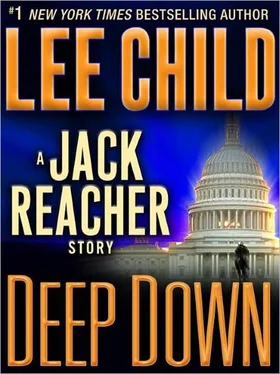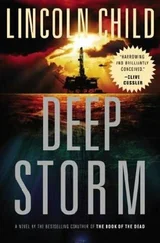Lee Child - Deep Down
Здесь есть возможность читать онлайн «Lee Child - Deep Down» весь текст электронной книги совершенно бесплатно (целиком полную версию без сокращений). В некоторых случаях можно слушать аудио, скачать через торрент в формате fb2 и присутствует краткое содержание. Жанр: Триллер, на английском языке. Описание произведения, (предисловие) а так же отзывы посетителей доступны на портале библиотеки ЛибКат.
- Название:Deep Down
- Автор:
- Жанр:
- Год:неизвестен
- ISBN:нет данных
- Рейтинг книги:4 / 5. Голосов: 1
-
Избранное:Добавить в избранное
- Отзывы:
-
Ваша оценка:
- 80
- 1
- 2
- 3
- 4
- 5
Deep Down: краткое содержание, описание и аннотация
Предлагаем к чтению аннотацию, описание, краткое содержание или предисловие (зависит от того, что написал сам автор книги «Deep Down»). Если вы не нашли необходимую информацию о книге — напишите в комментариях, мы постараемся отыскать её.
The suggested method: get close to each in turn.
The obvious problem: the most receptive will be the guilty one, with an agenda of her own… to kill the investigation – and the investigator.
Deep Down — читать онлайн бесплатно полную книгу (весь текст) целиком
Ниже представлен текст книги, разбитый по страницам. Система сохранения места последней прочитанной страницы, позволяет с удобством читать онлайн бесплатно книгу «Deep Down», без необходимости каждый раз заново искать на чём Вы остановились. Поставьте закладку, и сможете в любой момент перейти на страницу, на которой закончили чтение.
Интервал:
Закладка:
The supply guy said, ‘Keep it on. It’ll do.’
Reacher was supposed to supply his own pocket junk, so next up was ID. It had his real name and his photograph on it, but a master sergeant’s rank, and an infantry unit sufficiently generic to be plausible for a guy deployed with Special Forces, shooting individuals one at a time from a mile away.
‘How do I communicate with the colonel?’ Reacher asked.
‘Try the telephone,’ the supply guy said.
‘Sometimes hard to find a phone in a hurry.’
‘There’s no danger,’ the supply guy said. ‘It’s all just talking.’
The woman with the fanny pack and the headband crossed the Potomac on the Francis Scott Key Bridge, high above the water, running hard, die straight, through the hot swampy air, a glorious unbroken sprint, heading for Georgetown but not planning to get there. She was going to turn right on M Street, which became Pennsylvania Avenue, all the way to Washington Circle, and then New Hampshire Avenue to Dupont Circle, and then Mass Ave the rest of the way to the Capitol itself.
A crazy route, geographically, but any other option was either less or more than five miles, and five miles was what she ran. To the inch. Anyone else would have used her car’s odometer, on a quiet Sunday morning, but she had bought a surveyor’s wheel, a big yellow thing on a stick, and she had walked with it four separate times before she came up with eight thousand eight hundred yards exactly, and not a single step less or more. Precision was important.
She ran on. By that point she could feel a wide sweat stripe all the way down her back, and her throat was starting to burn. Pollution, hanging over the sluggish river, a visible cloud. But she dug in and pushed on, long, long strides, fast cadence, arms pumping. Her headband was soaked. But she was ahead of schedule. Just. Many variables ahead, but she had a chance of making it. Five miles in thirty minutes. Eight thousand eight hundred yards in one thousand eight hundred seconds. Fourteen and two-thirds feet a second. Not an international distance, so there was no world record. No national record, no Olympic record. But the greats might have done it in twenty-four minutes. So thirty was acceptable. For her, with traffic, and lights, and office workers in the way.
She pushed on, breathing hard, still moving well, right up there in the zone.
The traffic on 16th Street was stop-start heavy, frustration on every block, past Juniper Street, and Iris, and Hemlock, and Holly, and Geranium, and Floral. Then past Walter Reed, with the park green and serene on the right. The driver was no longer a bullet. He was shrapnel at best, subject to aerodynamic forces, jinking right and left between the lanes to win some fractional advantage on the dead-straight road. A Southern town, built for horses and buggies, perspiring gentlemen in hats and vests flicking mosquitoes away, now sclerotic with jammed vehicles, superheated air shimmering above their hoods, expensive paint winking in the sun.
He still had a long way to go. He was going to be late.
Reacher walked the corridors until he smelled an office with a coffee machine going. He ducked in and helped himself to a cup, practising a sergeant’s manner, on the surface quiet and deferential, with ramrod competence showing underneath. But the office was empty, so his acting was wasted, and the coffee was burnt and stewed. But he took it with him anyway, in one hand, the sheaf of documents in the other, all the way back to Cornelius Christopher’s office.
Christopher said, ‘You look the part.’
Reacher said, ‘Do I?’
‘Your file says you’re pretty good with a long gun.’
‘I do my best.’
‘You could have been a real sniper.’
‘Too much waiting around. Too much mud. The best snipers are always country boys.’
‘And you’re a city boy?’
‘I’m a nowhere boy. I grew up on Marine bases.’
‘Yet you joined the army?’
‘I’m naturally contrary.’
‘Did you finish your reading?’
‘Not yet.’
‘We checked for financial irregularities,’ Christopher said. ‘Or financial excesses, I suppose. But they’re all living within their means. Appropriate accommodations, four-cylinder cars, good clothes but small wardrobes, modest jewellery, no vacations, not that they’d take a vacation anyway. Not fast track people. Not if they want to be Chief of Staff one day. Or a defence industry lobbyist.’
Reacher put the thirty-year-old Lieutenant Colonel Christine Richardson to the bottom of the pile, and started in on the second of the women, twenty-nine years old and a mere major, name of Briony Walker, the daughter of a retired naval officer, brought up mostly in Seattle and San Diego, public elementary school, public high school, valedictorian, West Point.
Christopher said, ‘I hope it’s not her.’
Reacher said, ‘Why?’
‘The naval connection.’
‘You like the navy?’
‘Not much, but it’s still a military family.’
The third candidate was another thirty-year-old light colonel, this one called Darwen DeWitt, and right there Reacher knew she wasn’t the product of a military family. Not with a name like that. In fact she was the daughter of a Houston businessman who owned about a hundred dent-repair franchises. Private education all the way, softball star, West Point.
The fourth was Alice Vaz, age thirty, lieutenant colonel, granddaughter of another lieutenant colonel, except this one had been called Mikhail Vasilyevich and he had been a lieutenant colonel in the Red Army. A Soviet. His son, Alice’s father, had gotten out of Hungary just in time, with a pregnant wife, and Alice had been born in the United States. A citizen. California, public elementary, public high, West Point.
‘Notice anything definitive?’ Christopher asked.
Reacher said, ‘Their names are perfectly alphabetical. Alice, Briony, Christine and Darwen.’
‘OK, apart from that.’
‘Two of them are rich girls. What does that do to your money motive?’
‘Maybe taking money is a habit with rich people. Maybe that’s how they get rich in the first place. Did you notice anything else?’
‘No.’
‘Neither did we.’
The woman with the fanny pack and the headband was on New Hampshire Avenue, gunning hard up the rise, the hubbub of Dupont Circle already visible in the haze ahead. She was up two greens on the crosswalks and she could see it already, reaching the Capitol steps, slamming her hand on her wrist to stop the watch, gasping for air, once, twice, bent over, hands on knees, then raising her head, then bringing her arm up slowly, and blinking the sweat from her eyes and focusing on the pale LCD readout and seeing the magic numbers: twenty-nine something.
She could do it.
She hammered on, striding short because of the gradient, really breathing, really hurting, but still moving well.
The man in the car was still on 16th Street. He had the air on high, but even so he could feel sweat on his back. Vinyl upholstery, and a four-cylinder motor with no power to spare for a big compressor. He was just past Harvard Street, getting to where young and rent-strapped aides were forced to live. No cars for them. They were walking to work, right alongside him, about the same speed.
He watched one, a girl, in pantyhose despite the heat, the nylon scissoring fast, ugly white athletic sneakers on her feet, with tube socks, her dress shoes no doubt in the big bag she was carrying, along with briefing papers and position papers and talking points, maybe with a make-up kit, hoping against hope everyone else would be busy and she would get to go on the television news for a comment.
There were male versions too, dressed out of a Brooks Brothers’ sale, heads high, striding out. Every block brought more of them, twos and threes, until both sidewalks were full of them, all heading the same way, power walking, almost an army, an unstoppable force, clean-living and idealistic young people setting out to do good for their country.
Читать дальшеИнтервал:
Закладка:
Похожие книги на «Deep Down»
Представляем Вашему вниманию похожие книги на «Deep Down» списком для выбора. Мы отобрали схожую по названию и смыслу литературу в надежде предоставить читателям больше вариантов отыскать новые, интересные, ещё непрочитанные произведения.
Обсуждение, отзывы о книге «Deep Down» и просто собственные мнения читателей. Оставьте ваши комментарии, напишите, что Вы думаете о произведении, его смысле или главных героях. Укажите что конкретно понравилось, а что нет, и почему Вы так считаете.












